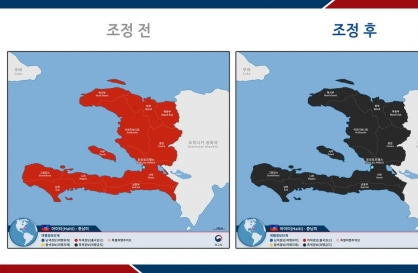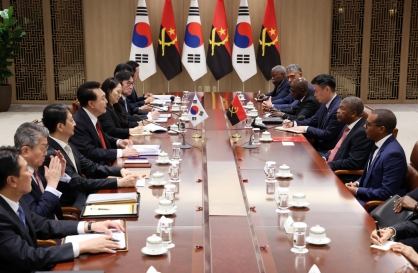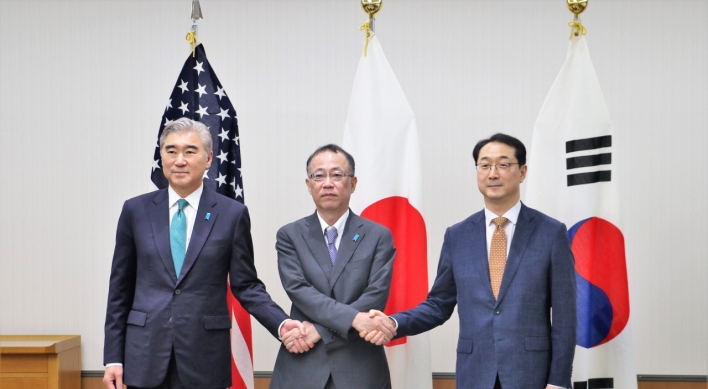Top South Korean, U.S. and Japanese nuclear envoys met here on Wednesday to discuss appropriate conditions for restarting the six-way talks with North Korea, apparently in response to China’s aggressive diplomatic efforts.
Glyn Davies, U.S. special representative for North Korea policy, hosted the trilateral session with his South Korean and Japanese counterparts ― Cho Tae-yong and Junichi Ihara.
The three sides reaffirmed that denuclearization should be the No. 1 agenda item if the negotiations are resumed, a diplomatic source said.
They also shared assessments of China-proposed pre-conditions for the resumption of the six-party talks, added the source.
On his trip to Washington last week, Wu Dawei, chairman of the now-suspended talks, put forward Beijing’s ideas on initial measures Pyongyang should take. Wu then traveled to Pyongyang, spawning media speculation of possible progress.
But a South Korean government official said China‘s proposal is not satisfactory yet, albeit “forward-looking.” The official did not elaborate.
After months of military provocations and threats, the North has turned to a charm offensive.
Seoul believes that the U.N.-led sanctions and Beijing’s cooperation played a part in Pyongyang‘s switch to dialogue mode in May.
“We must create a situation where North Korea has no choice but to admit that nuclear weapons are, after all, no strategic asset but a strategic liability that prevents North Korea from pursuing economic development and closer ties with China and other countries,” South Korean envoy Cho said in a recent forum hosted by the Jeju Peace Institute.
He dismissed Pyongyang’s call for the resumption of talks without preconditions.
“Given North Korea’s dismal track record, should we resume dialogue without robust preparations, it would prove a recipe for failure and can inflict mortal damage on the six-party talks,” he added.
The negotiations, also involving Russia, have not been held since December 2008 amid Pyongyang’s provocative acts and reneging on agreements.
China‘s Foreign Ministry said Thursday the nations involved should use their “wisdom” to restart the multilateral forum at an early date,
“Promoting denuclearization and upholding peace and stability of the Korean Peninsula serves the common interest of all relevant parties and also a shared responsibility of all parties,” Ministry spokesman Hong Lei said at a regular briefing.
“Under the current circumstances, the parties should use their wisdom, come back to the track of dialogue and consultations, and restart the six-party talks at an early date,” Hong said.
Meanwhile ranking diplomats from South Korea, Japan and China met in Seoul on Thursday to discuss closer trilateral collaboration amid frayed ties over historical and territorial issues with Japan.
The meeting brought together Seoul’s Deputy Minister for Political Affairs Lee Kyung-soo, China’s Vice Minister of Foreign Affairs Liu Zhenmin and Asia Bureau Director General Shinsuke Sugiyama from Japan’s Foreign Ministry.
The eighth meeting of the three countries’ ranking foreign ministry officials comes amid Japan’s unusually chilly relations with China and South Korea.
Japan’s recent renewed territorial claims to Dokdo, South Korean islets in the sea between the two countries, have chilled the two nations’ relations.
Furthermore, Seoul’s repeated calls on Tokyo to apologize and compensate for its sexual enslavement during World War II have also gone unanswered.
Meanwhile, tension between Japan and China has also been running high amid heightened territorial disputes over another set of islets.
On the agenda to be discussed in the Thursday meeting are ways to push for cooperative projects among the three countries as well as the possibility of holding meetings of their state leaders and foreign ministers, according to the Seoul Foreign Ministry.
Since 2007, the three Northeast Asian nations have held such meetings annually in order to facilitate peace and stability in the region where military and political rivalry runs deep.
But recent tensions have kept the neighbors from holding such gatherings, with the last foreign minister-level meeting and summit being held in April and May last year, respectively.
From news reports
- [Wang Son-taek] 'Lattice-like architecture' to manage alliances
- [Richard K. Sherwin] Trump‘s enablers on Supreme Court
- [Editorial] Mixed signals on trade front
- Jeonju film fest kicks off, featuring over 230 films
- Yoon vows to protect 'value of labor' on Labor Day
- [New faces of Assembly] Architect behind ‘audacious initiative’ believes in denuclearized North Korea
- On May Day, labor union blasts Yoon's foreign nanny proposal
- [Photo News] For future entrepreneurs
- New hard-line leadership of doctors group prepares for govt. dialogue
- [Photo News] KB premium banking center


















